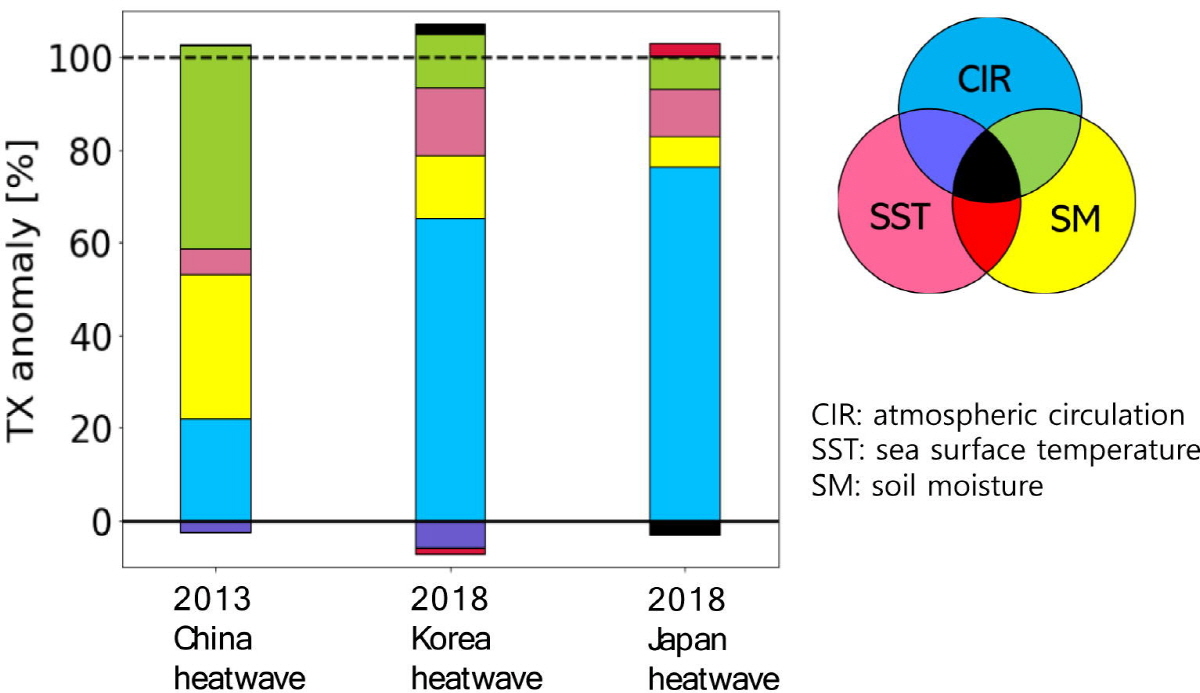Factors controlling extreme heat waves in East Asia identified by Professor Jinkyu Hong’s team
Heatwave control factors in Korea, China, and Japan were found to vary
according to different heat wave strengthening factors.
Heatwaves in Korea were caused by barometric blocking, drought, and ocean temperatures.

Professor Jinkyu Hong’s research team from the Department of Atmospheric Sciences at the College of Science recently announced new study results on factors controlling extreme heatwaves that occurred in East Asia.
They revealed that factors controlling the recent extreme heatwaves in East Asia showed differences in Korea, China, and Japan by time, even during the same heatwave period. This finding is expected to greatly contribute to understanding and predicting recent drought-heatwave complex disasters in which both drought and heatwaves occur simultaneously.
Despite the consensus that global warming by fossil fuel emissions is the main cause of recent heat waves, the occurrence and intensity of heat waves vary greatly across regions, making accurate diagnosis or prediction difficult without considering complex factors caused by different variables.

Over the past ten years, numerous studies have been actively conducted to understand regional differences in heatwaves and their relationship with drought, starting with research on those that occurred in Europe. However, in Korea, although there have been studies that analyzed a single heatwave control factor as in the 'blocking effect due to the effect of sea surface temperature or barometric stagnation' or claimed 'the connection between drought and heat waves in mainland China', there is no study that comprehensively investigated relative contributions of heatwave control factors in East Asia.
Professor Jinkyu Hong’s research team used a new high-resolution atmospheric model and factor analysis technique to analyze the controlling factors of recent mega heatwaves in East Asia.
The study findings suggest that there are differences in the blocking effect of barometric pressure, drought, and ocean temperatures in Korea, China, and Japan. Drought played a relatively large role in the heatwave in China, while the ocean effect contributed to the heat wave in Japan. However, in Korea, the blocking effects of barometric pressure, drought, and ocean temperatures were equally impactful due to the complexity of the topography and the combined influence of the land and ocean.
Moreover, the causes of heatwave control may be different even during heatwave periods, and the interaction between distinct control factors that have been overlooked in domestic and international heatwave research cannot be ignored in East Asia, presenting important implications for future research.
Professor Jinkyu Hong stated, “These research results show that the characteristics of East Asian heat waves are much more complex than those in Europe. Rather than simply determining the causes of European heat waves individually and independently and finding a single cause, new studies should look at the interaction of various factors.” In addition, regarding the significance of this study, he stated, “This will be the first step in improving the understanding and prediction of drought-heatwave complex disasters, which are expected to become more severe and frequent in the future.”
This research was conducted with support from the National Institute of Meteorological Sciences’ WMO IG3IS Support Project (KMI2021-01610) and the Korea Environmental Industry and Technology Institute's New Climate System Response Environmental Technology Development Project (RS-2023-00221109). The research results were published online on October 18th 2023, in Geoscience Frontiers (IF 8.9), the top international journal on earth science.
Find out more:
Title of original article: Factor analysis of recent major heatwaves in East Asia
Journal: Geoscience Frontiers
DOI: https://doi.org/10.1016/j.gsf.2023.101730
Contact corresponding author: Prof. Jinkyu Hong (jhong@yonsei.ac.kr)
Recommended Articles
Professor Byeong-Su Kim
New study demonstrates that “deformable” electronics are not a stretch
Professor Yeonjin Yi